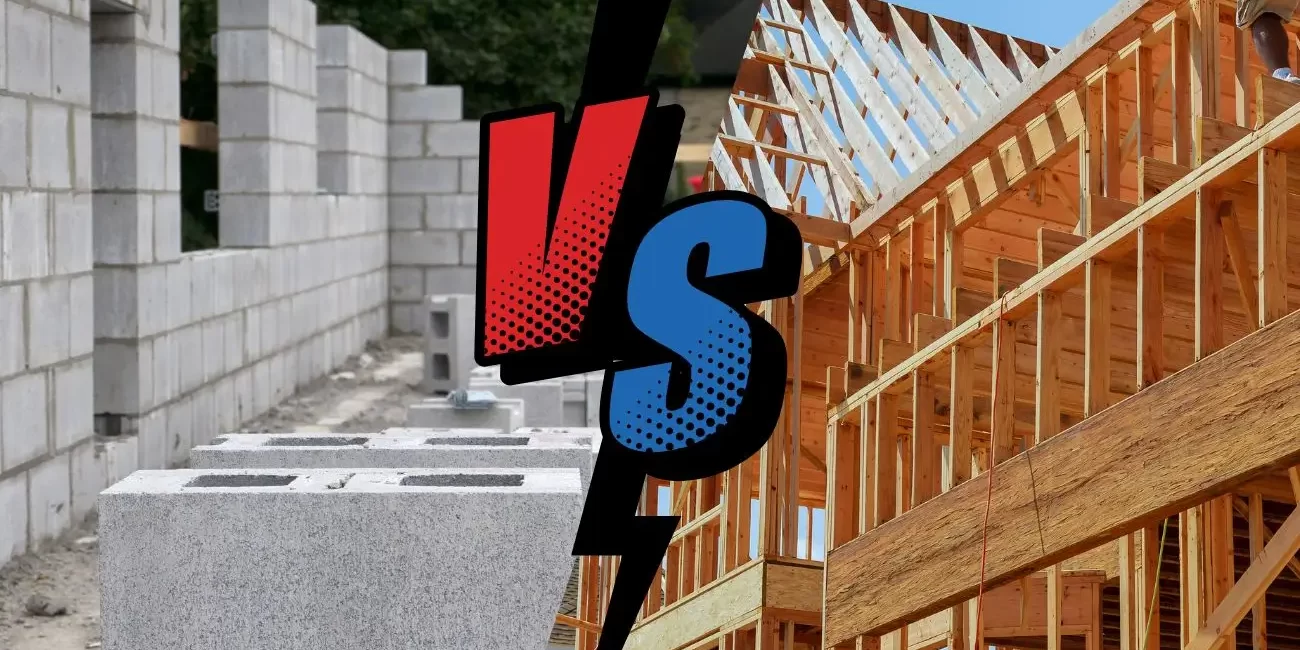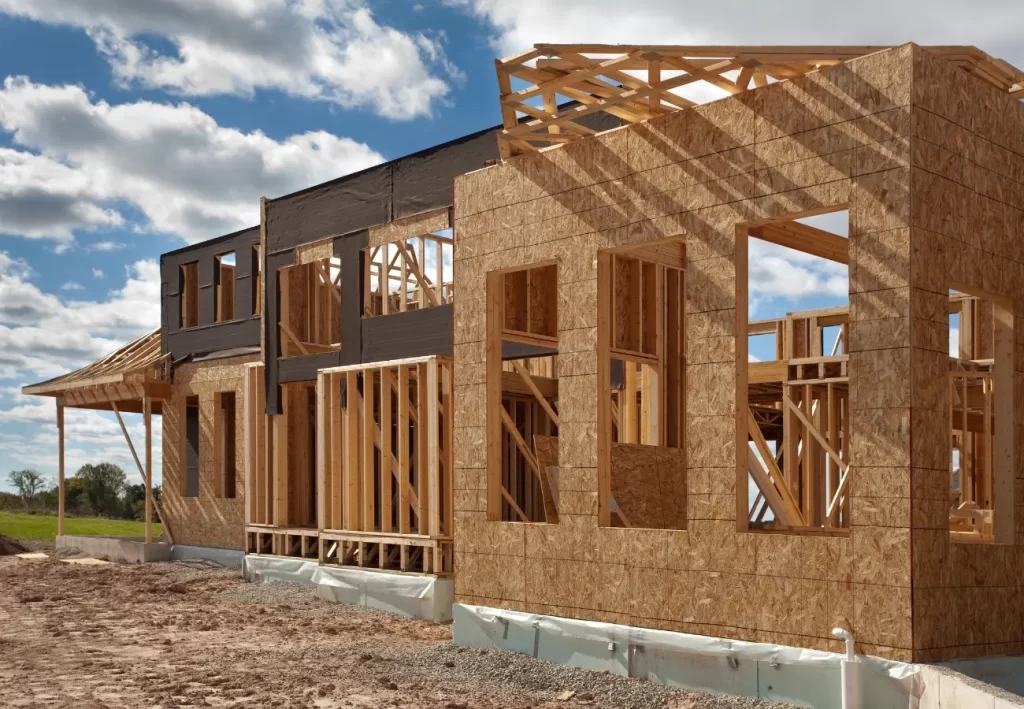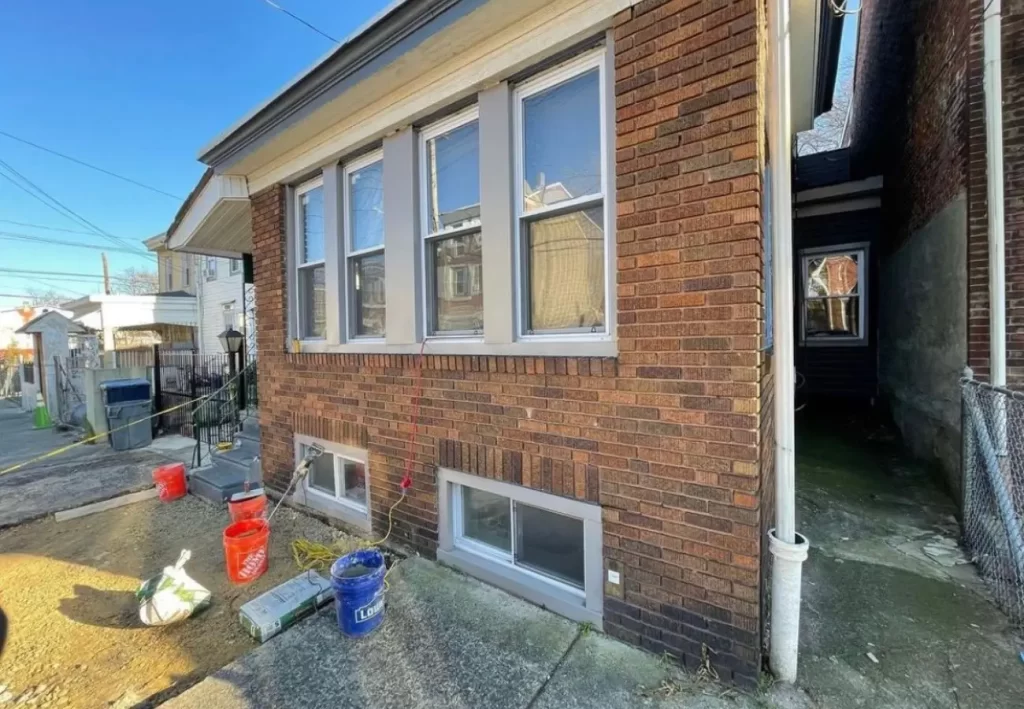Construction methods are the backbone of any building project. Decisions made in this realm have far-reaching consequences, from towering sky-rises to quaint family homes. The debate between frame vs. masonry construction interests not just those in the industry but also prospective homeowners and architectural buffs. Here, we’ll dissect the core differences and weigh the benefits of each construction method to help you make informed decisions for your next project.
Delving into Frame Construction
Frame construction is a system where the vertical and horizontal structural members support the building’s weight, with the inner cavity often filled with insulation. This popular method is synonymous with the rapidly growing urban skylines and is a classic choice for residential and commercial projects.
The Frame Construction Process
The process is a finely tuned symphony of timeliness and precision. It begins with laying a foundation and erecting frames on-site. These frames are constructed from steel, engineered wood, or traditional lumber and then bolted together to form the skeleton of the building. Easily adaptable, this method enables space to be utilized efficiently and offers flexibility in design.
The Advantages of Frame Construction
The benefits of frame construction are immeasurable, especially for modern building needs. It allows for open floor plans, quicker construction times, and easier integration of complex systems like HVAC and plumbing. Additionally, the materials used in frame construction are cost-effective and offer increased earthquake resistance, which could be critical in choosing the proper method for your project.
Uncovering Masonry Construction
Masonry construction, on the other hand, is as old as the hills but as sturdy as they come. This timeless method uses individual units, often laid in a mortar bed, to create the building structure.
The Masonry Construction Process
It’s a method that begins with creating a solid foundation and then meticulously layering bricks, concrete blocks, or stones individually. The load-bearing wall system is the essence of Masonry, as each material unit is a part of the load-bearing structure.
The Advantages of Masonry Construction
Masonry offers timeless aesthetic appeal and is often revered for its durability. It’s resistant to rot, fire, and pests and provides a level of thermal mass that can help regulate indoor temperatures. Although the upfront costs can be higher than frame construction, the longevity and lower maintenance costs over time are significant advantages.
Comparing the Two Titans
Cost and Construction Time
Frame construction often wins the race when it comes to cost and time. The standardized and off-site manufacturing of frame components can significantly reduce labour hours and material waste.
Masonry, however, is traditionally built on-site and typically takes longer than frame construction. The initial costs can also be higher due to the labour-intensive process and the investment in heavy, durable materials.
Durability and Maintenance
Masonry’s selling point is its endurance against the elements. It requires little maintenance beyond the occasional re-pointing of mortar joints. It’s the method of choice for buildings intended to stand for generations.
Frame construction, while durable in its own right, may require more maintenance over time. Wood-based frames are susceptible to termite damage and decay, but ongoing innovations mitigate these concerns with treated materials and improved techniques.
Energy Efficiency and Eco-Friendliness
Masonry’s thermal mass can store and conduct heat, making it an efficient natural insulator. In the colder months, this mass releases the heat it has stored, and in the warmer months, it absorbs heat, keeping interiors cool. It can significantly reduce the need for heating and cooling, leading to lower energy bills and a smaller carbon footprint.
On the other hand, frame construction’s lightness can mean better insulation, especially when combined with the latest energy-efficient materials and design strategies. Techniques such as double-stud framing and insulating concrete forms (ICFs) make frame construction a heavyweight in efficiency.
Environmental Impact
Both construction methods have their environmental pros and cons. Frame construction’s use of timber can be seen as more sustainable, mainly when sourced from managed forests. On the other hand, producing steel and concrete, materials often associated with frame construction, has ecological drawbacks.
While using materials that can be locally sourced and in plentiful supply, Masonry also has a carbon footprint associated with the energy required to produce and transport bricks, blocks, and stones. However, the longevity and recyclability of masonry materials can balance this out over time.
Frame vs. Masonry Construction: A Comparison
The debate between masonry vs. frame construction isn’t about finding a clear winner, but rather the best approach for each specific project. To help you visualize the core differences, we’ve included a table summarizing the advantages and considerations for each method:
Feature | Frame Construction | Masonry Construction |
Materials | Wood, steel, engineered wood | Brick, concrete blocks, stone |
Construction Speed | Faster | Slower |
Cost (Initial) | Lower | Higher |
Durability | Good, requires maintenance | Excellent, low maintenance |
Energy Efficiency | Can be good with proper insulation | Excellent thermal mass |
Fire Resistance | Moderate | High |
Seismic Resistance | Flexible, can deform | Less flexible, may crack |
Soundproofing | Good with proper insulation | Excellent |
Design Flexibility | High | Moderate |
Aesthetics | Modern, clean lines | Traditional, timeless |
Real-World Examples
In the heart of bustling cities, frame construction’s speed and efficiency make it the go-to for high-rises and mixed-use developments. Its adaptability to various designs and the ability to integrate technology-heavy systems seamlessly cater to the contemporary demands of urban dwellers.
With its whisperings from the annals of history, Masonry is evident in landmark buildings and heritage sites. Its indomitable strength and classic appeal are often non-negotiable when it comes to preserving or constructing structures that are expected to withstand the test of time.
Factors to Consider in Your Choice
Building Type and Use
The function of the building will heavily influence the construction method you choose. Multi-story commercial buildings may find the cost and speed advantages of frame construction more appealing, while single-family homes may opt for the enduring charm of Masonry.
Climate and Location
The local climate can guide your decision. In areas prone to seismic activity, the flexibility of frame construction may be the safer choice. Conversely, Masonry’s thermal mass makes it a natural fit for extreme temperatures and can make a building more comfortable and efficient.
Long-Term Goals
Consider the long-term vision for the building. If it’s a short-term investment, frame construction’s lower initial costs can be a significant factor. However, if the building is intended for long-term use or as a legacy, Masonry’s durability and low maintenance can save money and hassle in the future.
Aesthetic Preferences
Personal and cultural aesthetic preferences should be considered. Each method offers a distinct look and feel that can significantly impact how the building is perceived and whether it meets functional and emotional needs.
The Conclusion and the Future of Construction
The debate between frame vs. masonry construction is about finding a winner rather than the best approach for each project. Both methods have their place in an evolving construction landscape and continue to develop with new materials and techniques.
Each has unique advantages that cater to different project requirements. By understanding the nuances of frame and masonry construction and considering the outlined factors, you can align your project with the proper method for success.
Masonry and frame construction will continue to coexist, with increasing integration and hybridization, as the demands of the built environment evolve. Whether you stand amidst the history of one or the promise of the other reflects your needs and your commitments to the structures that define our spaces and lives.
If you’re considering masonry construction for your next project in NYC, Brick Tech Contracting Corp is a reputable company specializing in various masonry services in NYC, including brickwork, patios, sidewalks, and waterproofing. They can help you achieve the timeless beauty and enduring strength masonry offers. Contact Brick Tech Contracting Corp today for a free estimate and consultation!










